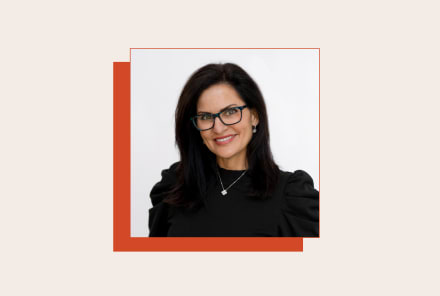Advertisement
I've Been Studying The Microbiome For 40 Years: Here's What My Diet Looks Like


It seems like we learn something new about gut health and the microbiome every day. But while we incessantly hear about the role of good bacteria in optimizing gut health, there’s a part of our gut’s ecosystem that’s been almost entirely ignored—fungi. As the scientist who named the mycobiome—our body’s fungal community—I'm working hard to change this. For over 40 years, I have studied the role of medically important fungi in our bodies, resulting in NIH funding for over two decades, over 400 peer-reviewed publications, and my work being cited by scientists over 18,000 times.
It’s been fascinating to be on the forefront of this research over the last few decades. As a result, at least a few times a week, someone asks me, "What does your diet look like?"
Very simply, I don’t eat to stay fit or keep my weight under control. I eat to optimize my gut’s microbiome.
Why? Because if you control the health of your gut, you control your overall health. I’ve found that controlling my weight and staying fit are pleasant side effects of the way I eat. The simplest way to think about it is that when we eat, we feed not only ourselves but also the bacteria and fungi in our guts. To do that, I focus my diet on a few key pillars:
1. Limited sugar:
I avoid sugar because it tends to encourage the growth of fungi like Candida. This is especially true of refined sugar because unlike sugar you get from fruit, it’s been shown to affect the way your gut works. So, for example in the morning, instead of plain sugar I’ll add some dried fruit like raisins or dates to a bowl of oatmeal.
2. Lots of dietary fiber:
I do this for two reasons. First, dietary fiber is a phenomenal prebiotic that encourages the growth of probiotic organisms in our gut. Think of it as food for the good bacteria and fungi in your gut. Second, dietary fiber can actually lower your gut’s pH levels, which actually helps keep bad bacteria in check. One way I incorporate fiber is through an afternoon snack. I’ll either have hummus with celery or I’ll grab a seasonal fruit like an apple or orange. That’s all it takes to get my fiber in for the day.
3. Plenty of "good" protein:
Increased protein has been strongly tied in a number of studies to a more diverse microbiome. But I stay away from red meat, which has been tied to a number of negative health outcomes. Instead, I try to incorporate protein from plants and from fish. So, for dinner, my wife and I often enjoy fish, like salmon or bass, with assorted roasted vegetables like onions, zucchini, carrots, and peppers over a small portion of rice.
4. Minimal alcohol:
I try to limit alcohol because it has been shown to have a profound effect on the health of your gut’s microbiome. But notice I say don’t eliminate it, because you can have a glass of red wine that’s full of polyphenols, which are very good for your gut’s microbiome.
5. No artificial sweeteners:
These fake sugars have been strongly associated with gut imbalance and weight gain.
6. Lots of herbs and natural flavors:
To keep things tasty, I’ll incorporate seasoning like lemon, garlic, mint, parsley, turmeric, and honey with olive oil because of their beneficial nutrients. These are great for the microbiome and help keep things interesting.
Now, you’ll see that I say I "focus" on eating certain foods, and not that I "only" eat certain foods. I think that’s important because I’m a human and I know that it’s incredibly hard to only eat this or that. Also, when I say to increase a type of food or certain ingredient, that does not necessarily mean you should only eat that food. As with your microbiome, a healthy diet is all about balance.
Is late-night eating a problem for you? Here's how to stop.
Watch Next
Enjoy some of our favorite clips from classes
Enjoy some of our favorite clips from classes
What Is Meditation?
Mindfulness/Spirituality | Light Watkins
Box Breathing
Mindfulness/Spirituality | Gwen Dittmar
What Breathwork Can Address
Mindfulness/Spirituality | Gwen Dittmar
The 8 Limbs of Yoga - What is Asana?
Yoga | Caley Alyssa
Two Standing Postures to Open Up Tight Hips
Yoga | Caley Alyssa
How Plants Can Optimize Athletic Performance
Nutrition | Rich Roll
What to Eat Before a Workout
Nutrition | Rich Roll
How Ayurveda Helps Us Navigate Modern Life
Nutrition | Sahara Rose
Messages About Love & Relationships
Love & Relationships | Esther Perel
Love Languages
Love & Relationships | Esther Perel
What Is Meditation?
Box Breathing
What Breathwork Can Address
The 8 Limbs of Yoga - What is Asana?
Two Standing Postures to Open Up Tight Hips
How Plants Can Optimize Athletic Performance
What to Eat Before a Workout
How Ayurveda Helps Us Navigate Modern Life
Messages About Love & Relationships
Love Languages
Advertisement

This Little-Known Supplement Helps Women Sleep & Decreases Signs Of Depression
Molly Knudsen, M.S., RDN

This Little-Known Supplement Helps Women Sleep & Decreases Signs Of Depression
Molly Knudsen, M.S., RDN















